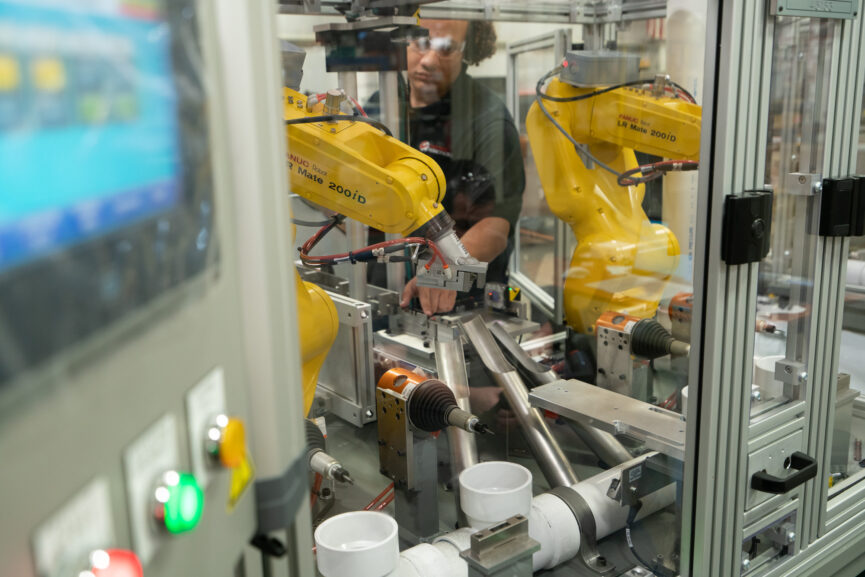Over the past century, the pace of technological advancement has gone from a steady jog to a full-blown sprint. Devices and systems have grown smaller, faster, and more powerful, while becoming increasingly accessible. With just a few taps or clicks, we can access and share limitless information in countless formats. Similarly, today’s automation technology is a marvel of efficiency, agility, and reliability—handling tasks with speed and precision that seem almost otherworldly.
Ahaus: Redefining Automation Innovation
Ahaus continues to help lead the way in this evolution, with decades of expertise in crafting industrial automation solutions that solve real-world challenges. By designing and building specialized automated equipment, we deliver practical, economical systems that empower businesses to reach new levels of productivity and efficiency.
Automation’s Transformation: Current Trends
- Collaborative Robots (“Cobots”): Unlike traditional industrial robots confined to cages for safety, cobots work side-by-side with humans. These robots are equipped with advanced sensors and AI capabilities, enabling them to perform delicate tasks while enhancing human efficiency.
- Artificial Intelligence and Machine Learning: Automation is no longer limited to mechanical repetition. AI and machine learning enable systems to adapt to complex, unpredictable environments. For instance, predictive maintenance powered by AI can minimize downtime by identifying equipment issues before they become critical.
- Edge Computing: With the rise of IoT devices, data processing is increasingly happening at the “edge” of networks rather than centralized servers. This reduces latency and enhances real-time decision-making, especially in automated manufacturing environments.
- Advanced Sensors and Vision Systems: Modern automation systems incorporate high-resolution cameras and advanced sensors for precise quality control, enabling defect detection and adjustment at an unprecedented level.
These are just some of the trends in manufacturing automation. More great information here: International Federation of Robotics and US Center for Advanced Manufacturing
Why Automation Matters: A New Era of Work
Machines don’t just replace or complement human effort—they elevate it. Automation has touched virtually every industry, from mining and food production to pharmaceuticals and, of course, manufacturing. Nowhere is its impact more profound than on the factory floor, where advanced robotics and assembly systems have redefined the production process.
The benefits? Automated machinery accelerates production rates, ensures consistent quality, and minimizes labor costs. Beyond financial efficiency, these systems also contribute to worker safety, taking on tasks that are dangerous or physically taxing.
From Conveyor Belts to Cognitive Robotics
It’s astounding to think about how far we’ve come since conveyor belts were considered groundbreaking. Modern manufacturing now uses sophisticated robotics, precision workholding fixtures, and adaptive control systems to manipulate, process, and transport materials with unmatched accuracy and repeatability. And the horizon promises even more: advancements in AI-powered robotics and the Internet of Things (IoT) are poised to usher in a new wave of innovation.
For example, the rise of upskilling opportunities: workers collaborate with cobots, learning programming and operational skills that are increasingly valuable in Industry 4.0 environments. Companies often pair cobot integration with upskilling initiatives, giving employees opportunities to grow their careers.
The Ahaus Advantage: Experience Meets Ingenuity
For over 75 years, Ahaus Tool and Engineering has focused on understanding the unique challenges of our clients and working to address them head-on. Whether it’s automating a repetitive task or engineering a custom assembly line, we combine technical know-how, hands-on experience, and creativity to deliver game-changing automation solutions.
The future of automation isn’t just about replacing manual labor; it’s about augmenting human potential. As we step further into the era of Industry 4.0, automation will continue to evolve—driving efficiency, enhancing safety, and opening up opportunities for new kinds of work. To stay ahead, companies must embrace continuous learning and invest in technologies that align with these trends.
Ahaus, with our commitment to innovation and excellence, is helping build the future of industrial automation.


